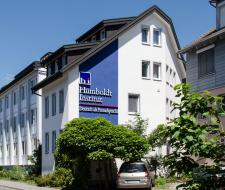Adult language courses in Germany for international students
This content was developed with active participation of Laura Galindo, who is a Marketing Director in OHLA Miami Language School.
In the process of preparing the material, we referenced the following sources:
- https://www.qs.com/the-worlds-best-modern-languages-courses/
- https://medium.com/@pangerankasep/how-to-study-german-in-germany-a-guide-to-immersive-language-learning-3d8c3a1db336.
-
 26th in Europe per the Full-time MBA
26th in Europe per the Full-time MBA GermanyBerlinCurrently watching: 3from 220.00 € / weekApply with documents
GermanyBerlinCurrently watching: 3from 220.00 € / weekApply with documents -
 ranked #42 in the QS Global MBA Rankings 2022
ranked #42 in the QS Global MBA Rankings 2022 GermanyHannoverCurrently watching: 4from 220.00 € / weekApply with documents
GermanyHannoverCurrently watching: 4from 220.00 € / weekApply with documents -
 from 945.00 € / weekApply with documents
from 945.00 € / weekApply with documents -
 The school is conveniently located in the central part of picturesque Berlin
The school is conveniently located in the central part of picturesque Berlin GermanyBerlinCurrently watching: 6from 715 € / 2 weeksApply with documents
GermanyBerlinCurrently watching: 6from 715 € / 2 weeksApply with documents -
 from 2150 € / 2 weeksApply with documents
from 2150 € / 2 weeksApply with documents -
 #39 In Bavaria
#39 In Bavaria GermanyNurembergCurrently watching: 1from 600.00 € / 4 weeksApply with documents
GermanyNurembergCurrently watching: 1from 600.00 € / 4 weeksApply with documents -
 #87 In Germany
#87 In Germany GermanyBerlinCurrently watching: 1from 3960.00 € / semesterApply with documents
GermanyBerlinCurrently watching: 1from 3960.00 € / semesterApply with documents -
 Apply with documents
Apply with documents -
 The school is located in an ecologically safe area.
The school is located in an ecologically safe area. GermanyKonstanzCurrently watching: 2from 185.00 € / weekApply with documents
GermanyKonstanzCurrently watching: 2from 185.00 € / weekApply with documents -
 from 2150 € / 2 weeksApply with documents
from 2150 € / 2 weeksApply with documents
Alternative destinations
Education information
German is one of the most popular language in the World. Many foreign students choose studying German as it can become a key to successfull and wide career opportunities in the future. SMAPSE offers TOP-20 language centers and private schools in Germany that are open to foreign students all year round. German courses will allow everyone who wants to improve spoken language, put pronunciation, plunge into European culture, get acquainted with the historical, cultural, literary heritage of a remarkable country.

The country has a large number of language schools for students and teenagers,and each offers several programs of different intensity, focus, duration. For foreign students who don't speak German, it is recommended to begin their study with a conversational (everyday) form - this format provides for a complete immersion. In communication with the media, everyone can quickly master the general vocabulary and the basics of grammar, and to raise the level recommended by major rating schools - the best of them are in Berlin, Munich, Cologne, Hanover, Constance.
Top Language Courses in Germany: A Comprehensive Guide
Germany offers an array of high-quality language programs that cater to students' varied needs. These courses are renowned for their excellent teaching methods, practical focus, attention to detail, and high success rates. Foreign students above the age of 16 can choose from beginner to advanced level programs, each with its unique features.

Standard Language Courses in Germany
The standard language course usually comprises 10-20 lessons per week and can last anywhere from 4 to 12 weeks. The most popular among these are the 8-week combined programs. These courses allow students to improve their German language skills, particularly in speaking, while also enjoying various leisure activities like sightseeing trips, shopping, and entertainment.
Intensive and Super-Intensive Language Courses
For those looking to master the language quickly, intensive and super-intensive formats offer a minimum of 30 lessons per week. These courses last between 1 to 8 weeks and feature the unique advantage of small group sizes (up to 6 people). This setup allows for personalized attention and helps students focus on improving their language skills effectively.
Professional Language Programs
These courses are also categorized under the intensive banner and range from 2 to 16 weeks in duration. Students dedicate six hours per day to study. The curriculum of these specialized business courses is purely practical, covering not just vocabulary and grammar, but also professional skills like business correspondence, reporting, and negotiation. These programs often prepare students for professional language exams, such as the Prüfung Wirtschaftsdeutsch for economists.
Academic Language Programs
Primarily aimed at teenagers and young adults, academic language courses prepare students for exams like ZMP, ZD, DSH, and TestDaF. These certifications are essential for those planning to attend university or seek employment in Germany.

At what age do foreign students usually enter English schools?
Our programs are for ages 16+. Nonetheless, the average age of our student population is between the ages of 18-35.
Language Courses in Germany Cost and Fees
Germany is a popular destination for language courses, particularly for learning the German language. One of the many benefits of studying in Germany is the high quality of education; however, this can come with a range of costs that potential students should consider. Tuition fees for language courses can vary widely depending on several factors such as the location, the reputation of the language school, the duration of the course, and the intensity of the program. In general, prices can range from around 200 to 500 Euros per week for intensive courses, although some premium programs can cost even more.
Location plays a significant role in the cost structure. Courses in cities like Berlin, Munich, or Frankfurt are generally more expensive than those in smaller cities or rural areas. This is not just true for tuition fees but also for the cost of living, which students must factor into their overall budget. Additionally, specialized courses like business German or medical German often come with a higher price tag due to the specialized vocabulary and teaching skills required.

Another aspect to consider is the type of course and its duration. Standard courses that run for a few weeks may be cheaper, but intensive courses, designed for rapid learning, can be more cost-effective in the long run, enabling the student to reach proficiency in a shorter period of time. Also, many language schools offer discounts for long-term enrollment, so it might be beneficial financially to commit to a longer period of study. Some schools even offer package deals that include accommodation, meals, and extracurricular activities, which can sometimes be a more economical option.
While Germany does offer some free language programs, particularly for refugees and EU citizens, most students will have to consider additional costs like enrollment fees, textbooks, and examination fees for proficiency tests like the TestDaF or Goethe-Zertifikat. Scholarships and financial aid are available but are generally quite competitive. Therefore, it's crucial to budget not only for the course but also for these additional costs to get a full picture of what your language education in Germany will entail.
In summary, the cost and fees for language courses in Germany can vary widely depending on a myriad of factors, including location, type, and duration of the course. While Germany offers high-quality language education, students should carefully research and budget for their experience, keeping in mind not just the tuition fees but also the cost of living and additional expenses like textbooks and exam fees.
How to apply to Language Courses in Germany
Applying for language courses in Germany involves several steps, and the exact process can vary depending on the institution and the type of course you're interested in. However, there are some general guidelines that can help you navigate the application process. First and foremost, it's important to do your research. Different schools have different specializations, reputations, and tuition fees. Consider factors such as location, course intensity, and course duration while choosing the right school for you. Websites, forums, and reviews are good resources for gathering information. Some schools also offer free trial classes or open days, which can provide valuable insights.
Once you've selected a language school and course that fit your needs, the next step is to check the admission requirements. Most language schools in Germany will require proof of your current language proficiency level, usually based on the Common European Framework of Reference for Languages (CEFR). Some schools might conduct their own placement test either online or on-site. Additionally, you'll often need to provide identification, such as a passport copy, and may also need to submit an application form detailing your personal information, educational background, and any specific interests or goals related to the course.
After you've submitted the required documents and fulfilled any prerequisites, the next step is generally payment. Some schools require a deposit upfront to secure your place, while others may require full payment before the course begins. Payment methods can vary from bank transfers to credit card payments, and installment options may be available depending on the school. Always make sure to read the fine print about refund policies and what's included in the course fee, such as textbooks or extracurricular activities.
In terms of timing, it's advisable to apply well in advance, especially if you need to arrange accommodation or apply for a visa. Speaking of visas, if you're a non-EU citizen, you may need a language learner visa or a student visa to study in Germany. The visa application will require proof of enrollment in a language course, sufficient funds to cover your stay, and health insurance, among other documents. Therefore, it's crucial to coordinate your course application with your visa application to ensure that all the timings line up correctly.
In summary, applying for a language course in Germany involves researching and selecting a suitable school, meeting admission requirements, making the necessary payments, and possibly applying for a visa. Each language school will have its own specific procedures and requirements, so it's important to thoroughly read all information provided and to contact the school's admissions office for any clarifications. Planning ahead and being thorough in your preparations will make the application process smoother and increase your chances of securing a spot in your desired language course.
Cost of living in Germany
| Expenses - USD/Month. | Min. | Med. |
|---|---|---|
| Accommodation | 263 | 357 |
| Food | 181 | 362 |
| Transportation | 62 | 197 |
| Communications and utilities | 90 | 137 |
| Clothing | 26 | 97 |
| Sports and leisure | 22 | 93 |
| Total | 644 | 1,243 |
| Accommodation in Germany | USD/Month. | |
| Shared room outside of centre | 266 | |
| Shared room in city centre | 361 | |
| 1 bedroom apartment outside of centre | 412 | |
| 1 bedroom apartment in city centre | 571 |
Statistics of English courses in Germany
| Programs | Intensity | Group | Language requirements | The minimum cost of the week |
|---|---|---|---|---|
| General German | 15-20 | 8-10 | Starter | €240+ |
| Intensive German Course | 28-30 | 5-15 | Starter | €250+ |
| Crash Course | 35-40 | 5-15 | Starter | €490+ |
| Exam Preparation Courses | 20-25 | 8-15 | Upper Intermediate | €270+ |
| German for Work | 20-25 | 7-10 | Intermediate | €270+ |
| Study & Live in your Teacher's Home | 20-30 | 1 | Starter | €1,450+ |
| German + University | 25-30 | 8-12 | Beginner | €295+ |
| Part-Time Courses | 4-15 | 8-10 | Starter-Beginner | €60+ |
| One-to-One lessons | individual | 1 | Starter | €60+ (1 lesson) |
Students Accommodation Options in Germany
| Accomondation | Meals | Number of people per room | Cost per week/min | Cost per week/max |
|---|---|---|---|---|
| Homestay | full Board or half Board | 1-2 | €180 | €350 |
| School residence | full Board | 1-2 | €190 | €300 |
| Appartment | without meals | 1-3 | €180 | €750 |
| Hotel | with/out meals | 1-2 | €30/day | €150/day |



